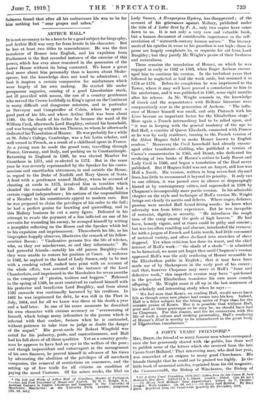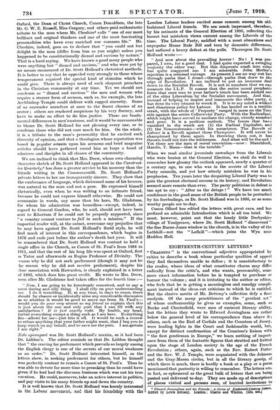A FORTY YEARS' FRIENDSHIP.*
Miss. DREW, the friend of so many famous men whose correspond- ence she has generously shared with the public, has done well to publish some of the letters which she received from the late Canon Scott Holland.' That interesting man, who died last year, was somewhat of an enigma to many good Churchmen. His friends thought that he could not be praised too highly. In the little book of memorial articles, reprinted from his old magazine, the Commonwealth, the Bishop of Winchester, the Bishop of • (1) A Forty rears' Friendehip, 1876-1017: Letters front the late Canon R. Stott Rolland to Mrs. Deer. Edited by S. L. °Bard. London Nisbet. 110.. ed. hSt..I Kemp Scoll Rolland : Soot, APPrechdlcs, 1.4,..t•taba4C.. London Gat6acr.net.l--(3) Henri/ curom m Drew. Reprinted irom the Constructive Quarterly tor December, 1918.
Oxford, the Dean of Christ Church, Canon Donaldson, the late Mr. G. W. E. Russell, Miss Gregory, and others paid enthusiastic tribute to the man whom Mr. Cheshire' calls " one of our most brilliant and original thinkers and one of the most fascinating personalities who have ever enriched our common life." Mr. Cheshire, indeed, goes on to declare that " you could not but delight in the man (differ from him as you might) unless you happened to be constitutionally dismal and envious by nature." That is a hard saying. We have known a good many people who were anything but " dismal and envious," and who were yet by no means enamoured of Dr. Scott Holland's rhetorical methods. It is better to say that he appealed very strongly to those whose temperament required the special kind of stimulus which he could give. There is always need of such eloquent preachers in the Christian community at any time. Yet we should not condemn as " dismal and envious " the men and women who require a sterner form of sermon, such as, for example, the late Archbishop Temple could deliver with ragged sincerity. Some of us surrender ourselves at once to the fluent charms of an orator ; others are reedered suspicious by his very fluency, and have to make an effort to do him justice. These are funda- mental differences in men's natures, and it would be unreasonable to blame Dr. Scott Holland for not pleasing every one, or to condemn those who did not care much for him. On the whole, it is a tribute to the man's personality that he excited such diversity of opinion, and that a theologian whose reputation was based in popular esteem upon his sermons and brief magazine articles should have gathered round him so large a band of admirers and disciples in all classes of the community.
We are inclined to think that Mrs. Drew, whose own charming character sketch of Dr. Scott Holland appeared in the Construct- ive Quarterly,' has done a greater service to his memory than the friends writing in the Commonwealth. Dr. Scott Holland's private letters to her are transparently sincere. They show that the exuberance of language, which distressed some of his hearers, was natural to the man and not a pose. He expressed himself rhetorically, even when he was writing to an intimate friend, because he could not express himself otherwise. He could not economize in words, any more than his hero, Mr. Gladstone, for whom his admiration was boundless—except, indeed, in regard to General Gordon, who, he said, should not have been sent to Khartum if he could not be properly supported, since "a country cannot venture to fail in such a mission." If the impartial reader will, at the outset, overcome any prejudice that he may have against Dr. Scott Holland's florid style, he will find much of interest in this correspondence, which begins in 1876 and ends just before the author's death last year. It will be remembered that Dr. Scott Holland was content to hold a single office in the Church, as Canon of St. Paul's from 1884 to 1911, and that the rest of his long life was spent at Oxford, first is Tutor and afterwards as Regius Professor of. Divinity. The :sawn why he did not seek preferment (though it may not be She reason why he did not receive preferment), despite his Arise association with Hawarden, is clearly explained in a letter of 1892, which does him great credit. He wrote to Mrs. Drew, soon after Mr. Gladstone had taken office for the fourth time :—
" Now, I am going to be ferociously conceited, and to say a most daring and silly thing. I shall rely on your understanding roe. I do it trembling. If, at any time, in days to come, there should by chaise* or incidentally arise any conceivable discussion se to whether it would be good to move me from St. Paul's— would you do your very utmost as my friend to explain thet this is just about the one and only post that I can fill with any satisfaction ? It is just exactly right. My health, my head, forbid everything except a thing such as I am here. Everything fits—allows for me—just hits it off. It would be such a sorrow to refuse anything that your father might want, that I beg you to keep watch on my behalf, and to save me the pain. I am4ertain 1 am right."
Nolo episcopari was Dr. Scott Holland's maxim, as it had been. Dr. Liddon'a. The editor reminds us that Dr. Liddon thought that " the craving for preferment which prevails so largely among the English clergy is one of the secrete of our moral weakness as an order." Dr. Scott Holland interested himself, as the letters show, in seeking preferment for others, but he himself was perfectly content to remain a Canon of St. Paul's. Thus he was able to devote far more time to preaching than he could have given if he bad had the diocesan business which was not his true; vocation. He could, moreover, take an active interest in politics,. and pay visite to his many friends up and down the country.
It is well known that Dr. Scott Holland was keenly interested'
in the Labour movement, and that his friendship with than
London Labour leaders excited some concern among his old- fashioned Liberal friends. We are much impressed, therefore, by his estimate of the General Election of 1895, reflecting the honest but mistaken views current among the Liberals of the time. The Liberal Party, saddled with a most obnoxious and unpopular Home Rule Bill and torn by domestic differences, had suffered a heavy defeat at the polls. Thereupon Dr. Scott Holland wrote :-
" And now about the prevailing horror a No I I was pre- pared, I own, for a good deal. I had quite expected a swinging majority the other way. But this desperate crash into ruins has quite staggered me. I am miserable. John Morley's rejection is a criminal outrage. At present I see no way out bat through paths that I dread—through paths that draw to the edge of Revolution. I am inclined to put an immense deal down to the Socialist Revolt. It is not in numbers that we can measure the I.L.P. It means that the entire moral prophetic, force that once rose to your father's touch has been sucked out of the older Liberalism by the Socialist movement. And that, instead of helping to inspire and transmute the older party, it has done its very utmost to wreck it. It is to my mind a wicked and disastrous policy for Labour. It has landed us in a terrible strait, with the whole of ` Property ' ranged in mass on the Tory side against the entire Collectivist Party. With the Radicalism, which might have served to mediate the change, utterly smashed and gone. It is a perilous outlook. The forces that have vanished in the wreck are (1) the Radical Capitalist, and (2) the Nonconformist—with his conscience. The Revolt of Labour is a Revolt against these Champions. It will never be championed by them again. In throwing them out, it has thrown itself out into the wilderness. And what will be the end ? Yet these are the men of moral conviction—now Blatchford, Hardie, T. Mann—that is the trouble."
When we read similar jeremiads nowadays from the Liberals who were beaten at the General Election, we shall do well to remember how gloomy the outlook appeared, nearly a quarter of a century ago, to one who was in the secrete of the Liberal Party councils, and yet how utterly mistaken he was in his prophecies. Ten years later the despairing Liberal Party was to gain the greatest electoral success in its history, and Revolution seemed more remote than ever. The party politician in defeat is too apt to cry : " After us the deluge ! " We have too much confidence in the good sense of the British people to be perturbed by his forebodings, as Dr. Scott Holland was in 1895, or as some worthy people are to-day.
Canon 011ard has edited the letters with great care, and has prefixed an admirable Introduction which is all too brief. We must, however, point out that the lonely little Derbyshire village of Youlgreave, where Dr. Scott Holland " discovered " the fine Burne-Jones window in the church, is in the valley of the Latbkill—not the " Lafkill "—which joins the Wye near Haddon Hall.



































 Previous page
Previous page